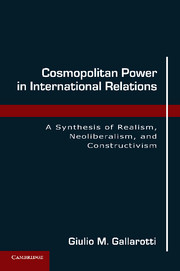 Cosmopolitan Power in International Relations
Cosmopolitan Power in International Relations The Classical Inspirations
Published online by Cambridge University Press: 05 June 2012
In the next two chapters, a crucial-case textual analysis is undertaken to shed light on the potential value of the theory of Cosmopolitan power for the study of power in international relations. In this application of a crucial-case test, I selected the very texts that have served as the greatest inspirations to contemporary Realist thinking in international relations: Hobbes’ passages on anarchy in chapters 13 to 15 of The Leviathan, Thucydides’ The History of the Peloponnesian War, Machiavelli's The Prince, E. H. Carr's The Twenty Years’ Crisis 1919–1939, and Hans Morgenthau's Politics among Nations. In this respect, I selected the great works of the founding fathers of Realism as less likely candidates for embracing the signature processes of Cosmopolitan power (soft power, hard disempowerment, and the optimality of integrating both sources of power), given the Constructivist and Neoliberal character of these ideas. If we find that these great works, as less likely cases, somehow testify to the importance of such processes, we have some compelling evidence for the importance of these ideas for the study of power in international relations.
The least likely cases would be found in the works of contemporary Realists such as Mearsheimer, Waltz, and Gilpin. Such contemporary writers do in fact show a complex and pluralistic rather than a singular barbaric vision of international politics – that is, not everything is driven by hard power politics and conflict – and they include processes in international relations that embrace soft power, such as cooperation and economic exchange. Contemporary Realists and their followers, however, do neglect or significantly downplay the role of soft power (Nye 2004a, 2). But contemporary Realists did not create their visions anew; their work has been built upon the shoulders of the venerated scholars who preceded them, those whose works are analyzed in this book. Thus, with respect to the leading contemporary Realists and their followers, the crucial-case tests undertaken here are intended to make more of a statement about the lessons they learned and applied in their own visions of international politics. Indeed, had they remained true to the lessons of the precursors from whose works their visions derived, their own visions would have embraced more of a Cosmopolitan orientation then has proved to be the case.
To save this book to your Kindle, first ensure [email protected] is added to your Approved Personal Document E-mail List under your Personal Document Settings on the Manage Your Content and Devices page of your Amazon account. Then enter the ‘name’ part of your Kindle email address below. Find out more about saving to your Kindle.
Note you can select to save to either the @free.kindle.com or @kindle.com variations. ‘@free.kindle.com’ emails are free but can only be saved to your device when it is connected to wi-fi. ‘@kindle.com’ emails can be delivered even when you are not connected to wi-fi, but note that service fees apply.
Find out more about the Kindle Personal Document Service.
To save content items to your account, please confirm that you agree to abide by our usage policies. If this is the first time you use this feature, you will be asked to authorise Cambridge Core to connect with your account. Find out more about saving content to Dropbox.
To save content items to your account, please confirm that you agree to abide by our usage policies. If this is the first time you use this feature, you will be asked to authorise Cambridge Core to connect with your account. Find out more about saving content to Google Drive.